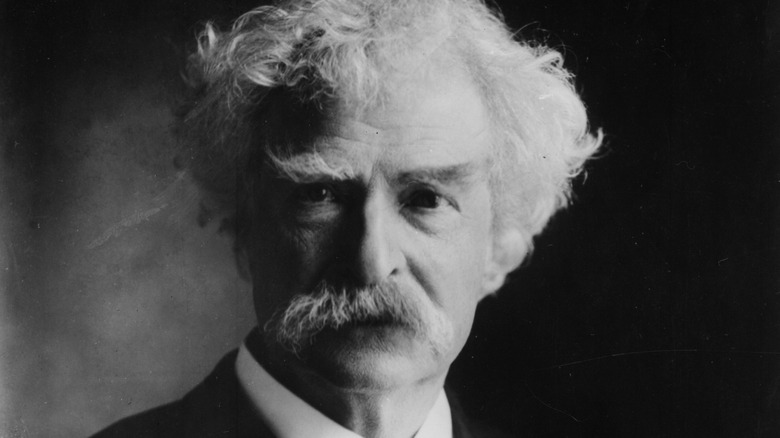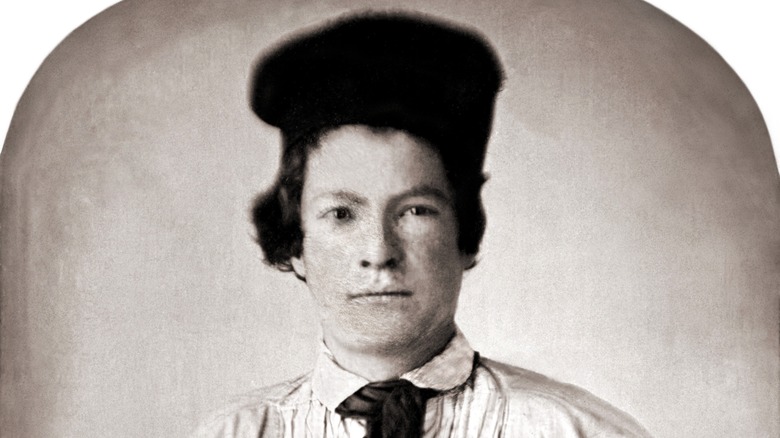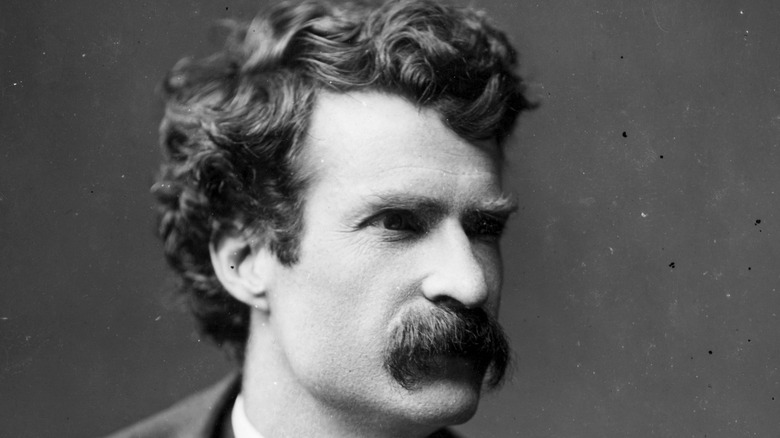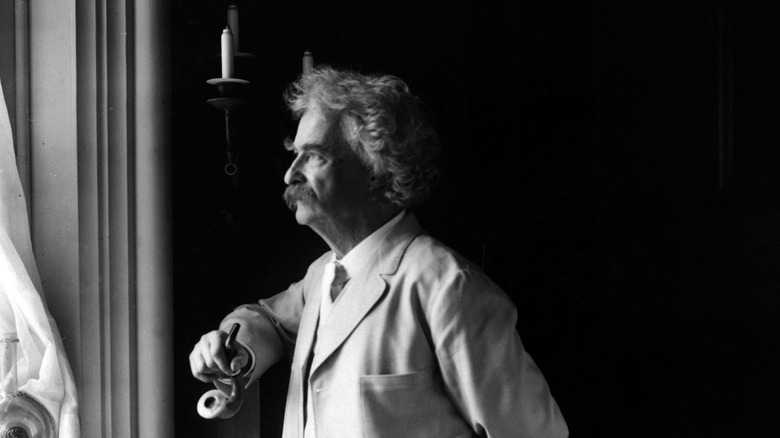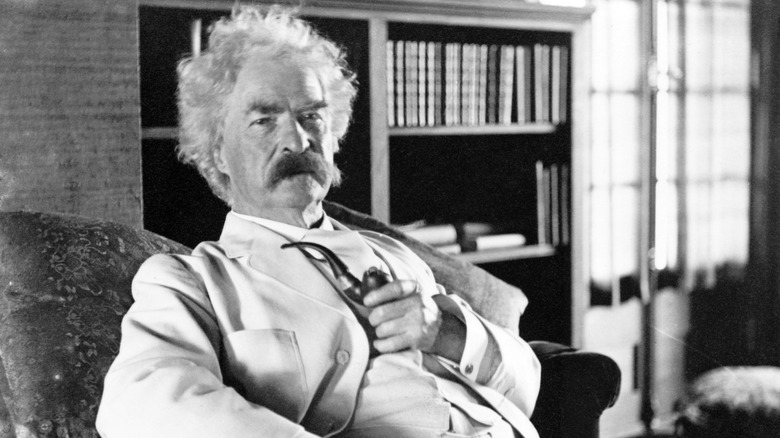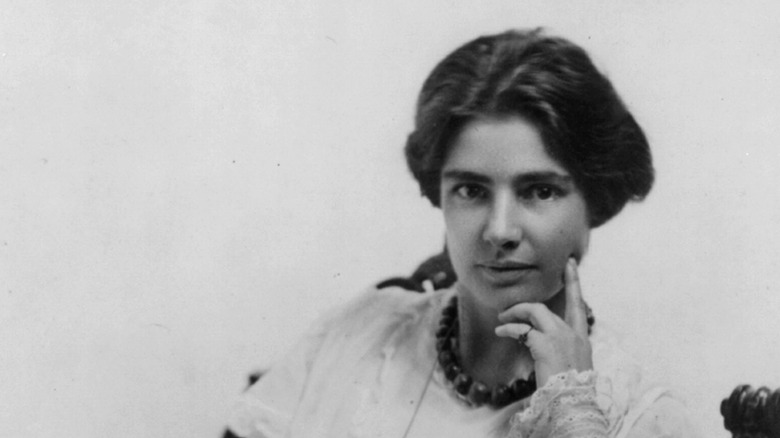Why Mark Twain Filed For Bankruptcy
Although the United States has produced its share of great writers — Ernest Hemingway, F. Scott Fitzgerald, John Steinbeck — perhaps no other name stands out more than that of Mark Twain. Born Samuel Langhorne Clemens (per Biography), Twain grew up in a family that presented financial stability but was always a hair's breadth away from ruin, thanks to his father's hair-brained investments. After his father died, Twain worked a variety of jobs before he eventually started making money writing.
Eventually, Twain would make millions. Unfortunately, he inherited his father's fondness for poor investments and lost money as quickly as he made it — several times over (per The Paris Review). Even his Connecticut mansion was at one time dilapidated and in need of costly repairs (according to the historic site's website). Despite his repeated and chronic financial difficulties, however, Twain was able to make a decent living at the end of his life. Though he filed for bankruptcy at least once, he left an estate worth approximately $15 million in 2022 dollars (via The Washington Post).
'Genteel poverty'
Samuel Langhorne Clemens was born on November 30, 1835, and he spent the majority of his formative years in Hannibal, Missouri (via Biography). At the time, Hannibal was a rough-and-tumble Mississippi River port city, and the people he grew up with — the town drunk, a girl he had a crush on, his crew of hell-raising pre-adolescent boys, enslaved people who passed through town — would inform much of his writing career.
Clemens lived in a middle-class home, and his father was a judge and shopkeeper. Though his father's earnings were enough to provide a decent living for his family, he'd set his sights higher: craving wealth, Mr. Clemens would frequently invest in land speculation — and just as frequently go broke doing so. The Paris Review described Samuel's childhood as "genteel poverty."
When Clemens' father died when the young lad was just 11 years old, the family's "genteel poverty" became actual poverty, and the boy was forced to go to work as a printer's apprentice. He would then go on to work in various other jobs: riverboat pilot, gold prospector, newspaper columnist. It was when he was living out West writing for newspapers that Clemens — now using the pen name Mark Twain — first started finding success as a writer.
Craving wealth
By the late 1860s, Mark Twain was making money and earning recognition as a writer, according to Time. Two other things happened around this time that later informed the financial decisions that led him into debt. For one thing, Twain's deal with his publisher left him rather salty about the publishing industry in general after the company promised him a share of the royalties — money that never materialized. For another, the period after the Civil War saw a dramatic change in the economic landscape in the U.S., and for many Americans, wealth was in view.
Twain was all about that wealth, according to Business Insider. Not because he had expensive tastes — to his dying day, he smoked cheap cigars — but rather, he just wanted the attention. "Man will do many things to get himself loved. He will do all things to get himself envied," he said (per Time). And he could have had that wealth if he'd made better decisions: By the age of 50, Twain was making money hand over fist and had married a wealthy heiress. However, he wanted more, and he couldn't stop investing his money in whatever interested him, for good or for ill. He even wrote that he was addicted to risk and couldn't resist speculating. It rarely ended well for him.
Bad investment after bad investment
Twain's list of bad investments he made reads like a how-to list if your goal is to go broke. For example, he invested in a typesetting machine — the Paige Typesetter — which weighed several tons and rarely worked (via Time). He started a publishing company named after his nephew (who, on paper at least, managed it) that made a fortune selling Ulysses S. Grant's memoirs and then promptly lost money on everything it subsequently published. Twain himself even called the company — which he started at least in part because he wanted to treat authors better than he'd been treated — a "lingering suicide." He also lost money on railroad stocks and on investments in a watch company and a magnetic telegraph. Perhaps ironically, he also had a chance to invest in Bell Telephone when he was one of the few people in the country who owned one but turned it down.
He wasn't just bad at investing; he was bad at money in general. For example, he reportedly asked his accountant to send him financial statements that his (Twain's) daughter Jean could read; Jean was a toddler at the time.
Bankruptcy and protein powder
After his publishing house went belly-up, Mark Twain found himself owing tens of thousands of dollars to banks, authors, and investors and was forced to declare bankruptcy in 1894 (per Time). Fortunately for Twain, he had an ace up his sleeve: being Mark Twain. Specifically, the author used his fame to embark on a worldwide speaking tour. He rented out his Hartford, Connecticut mansion and spoke to audiences around the world, taking in generous fees. Meanwhile, his books started selling again, and after a few years, he'd made enough money to pay back all of the people he owed.
Though rich once again, Twain still couldn't resist the pull of get-rich-quick schemes, and this time, he invested $30,000 in a "miracle" protein powder. Plasmon, Twain claimed, was so rich in nutrition that it could end famines while only costing a penny per day. It, of course, didn't work, and in 1907, Twain found himself in court, having sued company president Henry A. Butters for fraud. During the trial, Twain admitted that he'd been taken before. "I have been swindled out of more money than there is on the planet," he told the judge (per Time).
A healthy inheritance for his daughter
Though he'd made and lost several fortunes — and though decades earlier he'd sunk yet another fortune into yet another get-rich-quick scheme (which, of course, failed) — Mark Twain was able to die a reasonably wealthy man, according to Michigan Trusts. When he died in 1910, he left the entirety of his estate to his one surviving daughter, Clara Clemens (pictured above). His estate was estimated to be worth $477,000 at the time. Expressed in 2022 dollars, that would be in the neighborhood of $12 million, which is certainly an admirable nest egg by any standard. Still, had Twain not invested so poorly, this amount could have been far more.
His Connecticut mansion hadn't fared so well. During his worldwide speaking tour, daughter Susy stayed behind, and after she died, Twain and his wife couldn't bear to be in the house anymore, according to the Hartford Courant. They sold the house at a considerable loss, and it went through a series of owners and uses (via Connecticut Explored). By the 1920s, the mansion was dilapidated and in danger of being demolished. However, the people of Hartford weren't going to let that happen, and various efforts to save the house were invoked. Even until the 1950s, the once-great mansion was dilapidated until a group of investors came through to restore the building and turn it into a museum.
